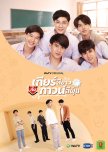
This review may contain spoilers
A pleasant but ultimately unsatisfying adaptation
This Kdrama version of a well-known Cdrama is a retelling for tweens that softens the male lead's character while over-infantalizing the female lead. In this remake we have a series that could easily be rebroadcast on Nickelodeon or the Disney Channel. Whether or not you like it might depend on which male lead you prefer -- the Kdrama's or the Cdrama's -- or whether you can tolerate the Kdrama female lead's lack of maturity as she gets older and enters into adult life.While from the beginning the Kdrama version of 'A Love So Beautiful' has a male lead, Heon, who is quite likeable, his counterpart in the Cdrama starts off as very hard to love, and who must face and acknowledge his own deepest flaws if he has any chance of prevailing in the end. The Cdrama scene where this acknowledgement finally happens is one of the most powerful in the entire series, and is all the more moving because we know how far the male lead, Jiang Chen, has had to come in order to get there.
Because the Kdrama's Heon starts off so nice, there is little distance for his character to travel as he faces his own shortcomings -- shortcomings which, of course, are minor in comparison. Unlike the Cdrama's Jiang Chen, Heon is not troubled by abandonment issues that have caused him to develop an almost impervious layer of emotional armor. Instead, Heon comes off more like a guy who's just a little too shy and needs to come out of his shell.
I know many viewers will prefer this non-threatening kind of male lead, and who am I to say they're wrong. However, in making Heon so comfortable from the start there is much less of a reason for him to strive to better himself. Nor does he help us to understand the reason for his unwavering dependence to Sol Yi. Heon is a character who, after all, we're meant to believe can't live without Sol Yi. Unfortunately, because Heon's eventual redemption in the Kdrama is less necessary than in the Cdrama, it's also less impactful, and deprives the Kdrama of an essential emotional turning point. We never really learn who Heon is or why Sol Yi's love has meant so much to him.
As for Sol Yi, there are two issues: (1) she is perky and over-animated to the point of constantly maxing-out my Cringe-o-Meter, and (2) from the get-go the actress who is cast in the role looks too mature to play a high-schooler. This impression is made even worse by the way the director has Sol Yi constantly exploding with child-like exuberance, squealing with delight at little provocation.
If this is the woman that Heon can't live without, I wish the series would make more of an effort to show us why. As it is, his approach to Sol Yi has a brotherly vibe that it never quite shakes off. In fact, toward the end when he kisses her on the lips it feels uncomfortably close to watching someone kiss his own sister.
Kim Yo Han, who plays Heon, is a K-Pop idol. He does a serviceable job in his acting debut and is cute enough to inspire the fantasies of viewers who wish they could have their own Heon in their lives. Enjoyment of fictional media -- be it books, movies, or drama series -- usually involves some degree of identification with the characters, so with such a handsome and cuddly leading male I can understand why in some corners the Kdrama version of 'A Love So Beautiful' would have a lot of appeal.
The other actors cast in the major roles fit the toned-down nature of the series very well, and are worthy counterparts to the characters in the Cdrama version.
The Korean remake of 'A Love So Beautiful' is worth a look if you want something fluffy to fill your time between other, better-scripted and better-directed dramas. While I have to admit that I was disappointed by it, I can see where it will provide some pleasant companionship for viewers who are more romantically inclined.
Was this review helpful to you?

I think we're still waiting for the documentary that shows such things as how a BL series comes together, how its impact and popularity are tracked and leveraged, and the whole concept of shipping, including how the shipping of BL actors in real life can impact those real lives.
I'm also curious how the actors who are part of a BL pairing are paired in the first place, how they're instructed to behave off camera, and whether the production companies go so far as to put stipulations in their contracts about it. For me this would show whether the people in charge wish to exploit the blurred perception of on-screen couples with the belief that they're actually dating.
This becomes an even bigger concern with underage actors. What do their parents have to say about how and why they got their boys involved in BL, and once production starts how are the interests of these young actors protected?
So, in short, given the documentary's provocative title I was hoping for a deeper dive that took some risks and spoke truth to power. What we got instead is a wade through the shallow end of the pool that will be more rewarding for beginner fans of BL.
If you'd already heard of this documentary then you probably know that Bright and Win are featured in one of the segments. For me they seem like an odd choice of actors to interview regarding how they approached their roles, since their '2gether' franchise is the subject of some debate over whether it's truly BL or actually a bromance. As actors they haven't (yet) been asked to kiss romantically on screen or even be shown cuddling shirtless in bed -- something that the documentary director's own films haven't shied away from. Why not talk to actors who actually *have* had to do such things on camera, and ask what their experiences were like? (And tell us what went on behind the scenes at '2gether' that resulted in all the guard rails being put up ....)
It makes me wonder if Bright and Win were the only actors available or were selected due to '2gether's' current popularity. (One thing for sure: their presence is being used to promote the film.) So many other BL couples would have been a better pick due to their longtime experience in the business: OffGun, KristSingto, TayNew, PeakBoom, or even the cast of '2 Moons 2', a series that the documentary director himself directed.
(I'm sure that Ohm Pawat and Toey Sittiwat would also have had some interesting things to say.)
So, this film is good enough for what it does but isn't quite the documentary the title promises it to be. I hope the director will consider making a 'Part 2'.
Was this review helpful to you?

The first few episodes seemed to deliver on the promise. In my rush to judgement on MDL I even posted an early rating of 9.5, in part because I wanted other BL fans to know that this was worth a look.
The series started out by exclusively taking Tine's POV, allowing Sarawat to develop as a character who was at times funny, charming, prickly, seductive, and above all, unpredictable. It was mainly because of Sarawat's interactions with Tine that the first few episodes of '2gether' were so enjoyable.
Then, about halfway through, '2gether' took a wrong turn and never found its way back. Around this time in the series Sarawat and Tine finally became boyfriends, and along with that the two boys took the momentous step of moving in together -- sharing an apartment, a bedroom, and (of course) a bed.
Now, the definition of 'boyfriend' can vary from person to person and even across different cultures, but for most of modern civilization, when two people are romantically involved to the point of living together, certain assumptions apply. One of those is that the relationship has evolved to the point of physical intimacy.
Once Sarawat and Tine had advanced past the flirting stage and become a couple, this became '2gether's' biggest problem. From that point on, one detail after another clashed with the everyday experiences of everyday people. While cohabitating, the boys would share the bed, but they slept fully clothed and never cuddled. They would stand together romantically under a starry night sky and not put their arms around each other or hold hands. They would comfort each other with words but not with a warm embrace. And a kiss, even a quick peck on the lips? Not happening.
The bottom line was that despite being two college-age guys in a m/m relationship, Sarawat and Tine showed no signs of sexual attraction. In fact any physical contact between them came off as awkward and uncomfortable. Somehow, whether at the behest of GMMTV, the director, the actors, or some element unknown, the decision had been made that despite Sarawat and Tine's boyfriend status and shared living arrangement, there would be virtually no displays of affection on-screen.
It was a wacky decision, and it showed in the final product. Time and again, a scene between the two guys would work its way to a point where the mood was clearly set for a moment of physical affection (whether it be an arm around the waist, a held hand, a tender hug, or a kiss), and '2gether' would veer away at the last second, often resorting to a substitute gesture that was more suited to best buds or actual sibling brothers. The substitute most frequently used was a pat on the head from Sarawat to Tine (which with each occurrence looked more and more condescending), but sometimes they didn't bother with any substitute at all. A scene would just end.
This is simply not how real boyfriends interact, and I think it's safe to say that everyone knows it, even adamant supporters of the series who have defended it for its 'purity' (as though the purpose of '2gether' was to depict a divine love unblemished by anything as sordid as hand-holding.) When a work of fiction deviates from commonly perceived reality without first establishing a believable reason for doing so, viewers get confused. When it happens over and over without explanation, viewers get frustrated.
What bothered me personally was that I sensed an agenda at play. I grew disillusioned, and found I was now watching each episode mainly to see how they'd keep screwing with reality. Along the way I noticed that Sarawat wasn't so endearing anymore, and Tine had become a paranoid bundle of nerves who forgot how to smile. The joy I found in their relationship -- and in the series -- was in ashes. When the final episode approached and the script deployed the trusty "ex-girlfriend who's still in love" trope to stir up some drama, the result just lay there like the stupid and insulting tactic that it was. You can't revive a patient who's already dead in the ICU.
By this time I'd finished mourning the loss of what '2gether' had started out to be, moved past my anger and resentment, and settled into amusement. I looked back on how much I'd anticipated the series and laughed at how I'd been fooled. This was a production presumably written and directed by experienced professionals who are familiar with the BL genre. It was mind-boggling how they'd squandered the fantastic beginning and ended up with something so phony and awkward. For me the plot had gone completely off the rails, so whatever story the series was trying to tell didn't matter anymore. What I became most curious about each week was how they'd finally pull this mess into the station, and what kind of shape it would be in when they did it.
And the way they ended it, of course, was with the high-five between Sarawat and Tine that has already gained near-legend status. I must admit that this was where the series, which had already established itself as a mockery of BL, proved it could still surprise me. It was as though the production team had gotten together to brainstorm and find a way for '2gether' to deliver a final, unmistakable "F U" to fans of the BL genre -- a gesture guaranteed to become the ultimate meme.
In this I think they succeeded, but it makes me fearful over what GMMTV will do with their future BL productions.
ACTING
In general I think the actors did a fine job with the script and the direction they were given.
Win's work as Tine deserves a lot of praise since he had no prior acting experience, whereas almost all of the rest of the cast did. His first foray into a series was a tremendous success for him personally and promises great things for his future career.
Regarding Bright, it's hard to tell if Sarawat's detachment and wooden affect was a result of Bright's inability to act or the fault of the director. Given the way the entire second half of the series was botched by the director, it wouldn't be a stretch to blame him for Bright's performance, at least in part.
That said, I get the sense that Bright did not enjoy being in a BL series. He was smart to agree to it because it provided the perfect target audience to rocket him to fame. (His previous acting gigs didn't result in anything close to this fanbase.) From here I'll be surprised if we ever see him play any other role other than a heterosexual male. And honestly, that's fine with me.
MUSIC
Scrubb! Awesome band, great songs. You don't even have to understand Thai to feel what the lyrics are saying.
I suspect that Scrubb might have also written the song that plays over the end credits of each episode, sung by Bright. It has their vibe and Bright does a nice job with it.
I'm not a fan of the song sung by Bright that was released as the series ended, but this opinion is probably tarnished by my disappointment over everything else.
REWATCH VALUE
I will never rewatch this series. While the beginning episodes are wonderful, there'd be no way to enjoy them knowing what comes later. In fact I'd probably start to pick apart the good episodes too, looking for hints of the lameness to come.
THE 'PORN' DEFENSE
A lot of diehard fans of the series have defended it by saying that anyone who criticizes the lack of physical affection between the leads is looking for a series that depicts explicit sex.
All I can say is: if this is your best argument then you have already lost. Nobody in their right mind wants explicit sex or porn in a BL series. When you have to misrepresent an opponent's argument in order to counter it, you're only saying that you don't have an intelligent response to what they are actually saying. You are admitting defeat. You are admitting that '2gether' is a failure.
Was this review helpful to you?

This review may contain spoilers
Cute bromance with a hint of BL
'Youths In The Breeze' is an anthology of three bromantic tales from Mainland China. Each of the stories takes up eight short episodes and is unrelated to the others.'The Boy and the Cat' is a fantasy about a boy who comes to stay with his older sister in her apartment and gets drawn into a rivalry with the cat who also lives there. It turns out that the cat has the ability to transform into a human whenever he wants to. He does this only when the sister isn't looking, so only the younger brother becomes aware of this secret power.
A bit of territorial combat ensues between the human version of the cat and the younger brother. This culminates in a final test where the boy and cat agree that whoever ends up the loser will leave the apartment forever -- either the boy will travel outside the country to study abroad or the cat will go with one of his cat friends to some sort of cat kingdom that is never fully explained.
Once the winner of this face-off has been decided and the loser is ready to leave, both the boy and the cat realize that they really don't want to separate, and that they really don't dislike one another either. They each decide to keep living together in the sister's apartment so that they can continue their cozy friendship while keeping her company at the same time.
'People from the Story' is another fantasy tale, this time about the author of an adventure novel where the main character suddenly emerges from the book into real life. Since the author has intended for this character to die at the end of the book the two men get into a disagreement over his ultimate fate. At one point the author goes back with the character into the world of his own novel, and while there he comes to realize the story's painful parallels with his own life and losses.
'Full-time Sworn Enemy' is the one story in the trilogy that doesn't have a fantasy element. Here, two athletes attending a special training camp for elite runners clash repeatedly with one another, but they gradually become closer as the roots of their rivalry become clearer and a past misunderstanding is resolved.
All three of these stories have happy endings, although the one for 'People from the Story' was a little confusing to me for other reasons.
There are familiar BL tropes sprinkled throughout these three tales, giving us occasions to wonder 'Are they or aren't they?' For instance, at one point two main characters both fall to the floor and accidentally end up with one on top of the other, gazing into each other's eyes -- which of course is a traditional sign that their relationship is headed toward romance. There's also a bit of side-by-side sleeping with a wayward leg draped over one's companion.
For me, the best confirmation that more than friendship is intended here is the sneaky appearance in the final episode of the movie poster for 'Brokeback Mountain'. This occurs about two minutes into the episode and could easily be missed, but I don't doubt for even a second that it is there with a specific purpose.
'Youth In The Breeze' doesn't stake out any major new ground but is cute and engaging, and the main cast is quite attractive. It's also nice to see a Mainland bromance that is gently testing the boundaries of the genre.
Was this review helpful to you?

This review may contain spoilers
In the past year the BL community has had the odd experience of three expensively-produced BL productions reaching their final few episodes only to collapse under their own aspirations, angering viewers and overshadowing all of the elements that they might have gotten right. In all three instances it can be said that these series (HIStory 3: Make Our Days Count, 2gether, and The Shipper) were trying to do something "different" with the BL genre. For 2gether, the intent was to reach a more global and conservative audience by toning down the gay aspects of Boys Love and replacing them with bromance. For HIStory 3: MODC and The Shipper, the directors aspired to transcend the BL genre and deliver something more realistic and thought-provoking. Unfortunately, the way both of these series did it was by killing off a beloved main character.
For me, a main character's death is as inappropriate in a BL production as a high-kicking chorus line would be in a production of King Lear. In the case of The Shipper, an artful story was already being told very well, and the series actually did seem to be transcending the genre. So many commenters on the MDL page have mentioned how the body-swapping theme sounded unpromising at first, but after giving the series a try they found that it played exceptionally well. Why, then, did the series end up killing off one of the main characters, even before they'd had a chance to actually be in a relationship with their partner?
I still have yet to learn how Kim's death in The Shipper served the themes of the series. At least in the case of MODC, the director had a theme that she wanted to promote ("make sure you cherish every moment with the person you love because you don't know when they'll be gone"). Attaching such a theme to a BL series proved to be a mistake, but she had her reasons.
For The Shipper, the character death seems gratuitous because its theme about ships, shippers, and the people being shipped doesn't need for anyone to die in order to get its point across. (Plus there's that tease about a sequel in the very last moments of the final episode. If Kim can live on in a sequel then why not in the original?)
Now, I've seen where because the main character of The Shipper is Pan and the "real" Kim has limited screen time, people have said that the series doesn't qualify as BL. Pan's journey, though, is mainly about discovering who the real Kim is, and as she learns more about him the viewers learn along with her and their affection for him deepens. By the time she hits the paydirt that yes, Kim and Way have a relationship that goes beyond friendship, we've become completely invested in that pairing. We're in it to win it! We thrill over Way's epiphany that he actually loves Kim, then get even more excited over the proof that Kim also loved Way, and from that point on Kim has become as important to the series as any of the main characters who've had more screen time.
How sad, then, that none of these revelations can ever get acted on or rewarded because one of the boys turns out to be dead. We discover that what's been served up is a full-blown BL storyline but with a tragic ending. And if anything doesn't belong in a BL storyline, it's tragedy.
It must be said, too, that the longer Pan stays in Kim's body the less appealing she becomes as a character, deciding to intervene with the people in Kim's life to make sure they know that he's actually not a good person. At one point I became disgusted by her judgmental attitude and smug sense of superiority. I'm not convinced that she ever truly lived that down, thus weakening her standing as a main character that people can sympathize with completely. In this regard Way is the much better person, and all the more deserving of the happy ending that the series squanders on Pan.
It also bothers me that the hetero-normative couple gets the happy ending while the m/m couple gets the dead boyfriend. Back in the 1950's, death was in store for most gay characters because the morality of that era demanded that they meet a tragic fate. In this sense The Shipper is terribly unenlightened and regressive. It would have been so easy to give both the m/f and m/m couples a happy ever after, and it would have more effectively communicated how every kind of love deserves nurturing and respect.
A happy ending for all would also have been befitting the BL theme of the series.
I would have liked to listen in while the creative team for The Shipper worked on the storyboards and reached the decision that Kim would be killed off. What the heck were they thinking? They obviously misread their audience in a fundamental way, and I can only hope that GMMTV takes heed of misfires like The Shipper when they hire the next production company to mount a BL series.
In about three months I plan to do an experiment where I'll approach a few BL fans at random and ask them what they remember most about The Shipper. I think I know what the answer will be. In the meantime I'll be checking in with The Shipper's MDL page every now and then to see how many comments are NOT about the crappy ending. (Not many, I bet.)
This is the danger of messing with a genre that people absolutely love. But, after what amounts to three disastrous decisions in three expensively produced series, I'm starting to wonder if anyone in charge really cares.
Was this review helpful to you?

Asuma Ibuki and Otazawa Mei are Mutsumi's classmates. They've been best friends since childhood, with the tomboyish Ibuki always at Mei's side as her constant protector and savior. Mei is shy to the point of being almost incapable of interacting with anyone else, so the two of them focus solely on each other, rarely allowing anyone else into their circle.
With Mei being so fearful of other people, Mutsumi at first sees her as his ultimate challenge, but as soon as he starts in with his usual tactics to win her over Ibuki realizes what he's up to and fiercely shuts him down.
This leads the undaunted Mutsumi to start thinking that Ibuki herself would be an even more challenging conquest than Mei. He makes a bet with two of his friends that he can make Ibuki fall in love with him, and from there the game begins.
A compelling addition to the series are occasional "self confessional" videos where individual characters sit alone and reveal their private thoughts and feelings. These segments are filmed in portrait mode as though recorded with a mobile phone, adding to their sense of immediacy and rawness. It is here that we learn how troubled Mutsumi really is, and Mei as well. In Mutsumi's case these sessions expand upon his character and make him more sympathetic, and it's through them that we learn that the feelings he's showing toward Ibuki have become real for him.
Ibuki is the most central character to the series, since the other three -- Mei, Mutsumi, and a younger student named Sakurai Nao (introduced about midway through the series) -- are much defined by the ways in which Ibuki has awakened a need in each for a deeper connection with her.
Performances are superb all around.
Itagaki Mizuki impressively navigates the many sides of Mutsumi's character, making us gradually understand why he's become so guarded and hostile, and eventually making us want the best for him. With Ibuki's encouragement Mutsumi gathers the courage to let others -- including his estranged mother -- know the real him, and it's endearing to see how much wonder he feels over Ibuki's sincere concern for his emotional well-being.
Takeda Rena as Mei fully embodies that character's vulnerability, and we cheer her on when she finally attempts to expand her world beyond Ibuki, one tiny step at a time.
Rounding out the main cast, Goto Yutaro makes a perfect Nao, androgynously beautiful and fearless in his own way, not hesitating to make his feelings known to Ibuki as soon as he realizes them.
'Sixteen Shoukougun' ('Sixteen Syndrome') is much more than a high school romance. Its complex characters will stay with you long after it has ended, and if you're like me you'll be returning to it again to pick up on what you might have missed before.
Was this review helpful to you?

This review may contain spoilers
The biggest mistake of Best Mistake Season 2 is that it's centered around a mean and deceitful new character while at the same time trying to tease us with a love triangle where the conclusion is so foregone that you just feel sorry for the poor sap who you know is destined to be turned away by his crush before the last bell tolls.What's also annoying is that the writers endow the mean and deceitful character with a seemingly superhuman ability to manipulate people, allowing her to get all of these close friends to distrust and turn on one another after what for some has been years of friendship. I hate it when a series is so lazy that it resorts to something like this. Unfortunately, it's all too often what a series will do in a second season because they can't think of anything else to be dramatic about.
The problem is, with Best Mistake Season 2 everybody watching knows that if these close friends were to have just one realistic conversation amongst themselves to compare notes, Ahra's lies would unravel and she'd be exposed within a couple of days. But instead we're supposed to believe that almost every one of these people has undergone a common-sense lobotomy that renders them incapable of anything but wide-eyed wonder over Ahra's beauty.
Also at issue during Season 2 is Hyunho's struggle over being misjudged by the education system, and in particular by a teacher who has a knack for popping up every now and then just to lower his self-esteem a little bit more. On a couple of occasions she takes a few shots at Yeondoo as well, telling her that she owes it to herself to break up with Hyunho because he's a loser who will just drag her down. Smart girl that she is, Yeondoo will have none of it, but alas poor Hyunhoo proves to be not as strong. Since the teacher is blind to his efforts to improve, cruelly dismissing him at every turn, he eventually starts to believe her BS and ultimately decides that he should, indeed, break up with Yeondoo, supposedly for her own good. The breakup is half-hearted at best but still manages to devastate Yeondoo.
This is where the love triangle comes in, and where Season 2 actually does something wonderful. No, it's not the love triangle itself, but rather the introduction of a new character who is complex and interesting. Seunghyun is an athlete who starts out as aloof and unapproachable. His standoffishness is what especially irks Hyunho, whose territorial instincts go haywire from the get-go. He becomes very wary over Seunghyun, and it is to his credit that it eventually turns out that in this regard he does, actually, have something to worry about.
Although many viewers (mainly out of loyalty to Hyunho, I suspect) are put off by the way Season 2 develops the friendship between Yeondoo and Seunghyun, I think the tentative way that Seunghyun builds up his trust in her is very sweet. Pretty quickly it develops into a one-sided crush on Seunghyun's part, and that's another thing that I believe is depicted realistically and with great insight. As Yeondoo slowly breaks down Seunghyun's somber exterior we start to see someone who is ethical, sincere, and probably more than a little bit lonely. Yeondoo has precisely the personality to pry open the feelings of someone like that, just by being herself, and through one kind-hearted interaction after another that's exactly what happens.
I think people can hate the love triangle itself (blame the writers for that) but they shouldn't take it out on Seunghyun, who turns out to be respectful of Hyunho and Yeondoo's relationship even during most of the time when they've supposedly already broken up. Seunghyun can sense that their breakup isn't really final, so in his insistance on always playing fair he waits until the moment when he finally gets word that they are definitely, positively over with before making his move. For this I think the guy deserves a lot of credit! It's got to be the first time he's ever approached a girl so there's so much potential for a rookie mistake, but he still navigates the situation in a way that avoids hurting anyone. In Seunghyun I think we have an amazing character, and Lee Jung Joon's performance in the part is nuanced and masterful. He gives us a Seunghyun who in some ways is even more compatible with Yeondoo that Hyunho is.
(Also, one thing we should always keep in mind is that Seunghyun is the one who finally manages to expose Ahra and eventually get Hyunho and Yeondoo back together again. So please stop hating on my boy!)
Regarding Hyunho, I think one of the reasons Yeondoo chooses to take him back in the end is not only that they're the main couple for the whole series (duh) but given her nurturing personality she knows that Hyunho just needs her in his life much more than Seunghyun does. Hyunho's fragility in this regard is just one of the ways that I think Kang Yul does such a terrific job in playing the role. He gets it right when depicting how such a person is always struggling between bravado and vulnerability. It's this very duality that endeared Hyunho to viewers so much in Season 1, and Kang Yul keeps up the good work in Season 2.
Another great thing about Hyunho's character is that he's always skeptical about anything the evil Ahra says or does. (Big ups to Ryu Sul for also refusing to be taken in by Ahra. She's not only skeptical of her but downright combative about it. Hey, Ryu Sul, I didn't like you in Season 1 but in Season 2 you're killin' it.)
Meanwhile, Yuna proves that she is shallow, dumb and pathetic by wallowing in her ridiculous one-sided love for Seunghyun, and allowing Ahra to convince her that Yeondoo -- Yeondoo of all people! -- is a phony. I can only be grateful that the writers didn't toss her a bone in the end by actually pairing her up with Seungyun. Yuna, girl, you are a sad excuse for a best friend. If there's a Season 3 please do not show up.
Another new character who deserves a thumbs-up is Ah Hoon. He's a cool kid who just needs some big-brotherly guidance, and that's exactly what Seunghyun provides for him. It's not clear to me what purpose he really serves in the season other than to provide comic relief in what in many ways was a bleak season, but it must be said that Keum Dong Hyun does a fantastic job in his drama debut, and I enjoyed the bromance between him and Seunghyun immensely. Part of me hopes that there will be a Season 3 and that the reason for Ah Hoon's introduction in Season 2 is that he'll be the central character in it.
As a last complaint, I think another dishonest thing the writers do is to surgically remove Ji Sung's backbone when it comes to Ahra. She humiliates him to the core after her plot unravels and she's exposed as the snake that she is. She even tells him to his face that she could never really be attracted to someone like him. This is one cruel person, I'm telling you. After all of this treachery, what we see in the last episode is that Ji Sung has skipped the big reunion lunch with his friends and actually decided to SIT WITH AHRA in the cafeteria. Seriously? Here we have a series that has spent 15 episodes showing us what a total lowlife Ahra is, then in the finale they suddenly want us to feel compassion for her. Well, sorry, no sale. Seeing Ji Sung sit with her was just annoying af. I'd rather they just hadn't shown Ahra at all in that episode rather than extract the last modicum of self-respect from poor Ji Sung. I know we're supposed to view it as a teachable moment and think he was doing something noble by extending forgiveness, but people like Ahra need to feel the consequences of their actions or they will never stop.
So, while I could rewatch Season 1 over and over (and actually did during Season 2's airing), I don't think I'll be returning to Season 2 that often. If I do it will mainly be for the two characters, namely Seunghyun and Ah Hoon, who can't be found in Season 1. The franchise still has lots of life in it and I'd be super excited for a Season 3. Either center it around Ahoon or follow the gang to college. The characters are so vivid and lovable and I don't want to be missing them for too long.
Final word: It's funny how my review of Season 1 is really short but this one turned into a novel. I guess it's because I feel that a review that's mostly negative needs to do some explaining. If you got this far while reading it then I'm very flattered and thank you for your time!
Was this review helpful to you?

This review may contain spoilers
This series is a bumpy and sometimes muddled ride. The production team apparently didn't trust the original novel enough to give it a direct dramatization, instead opting for a "life lesson" approach that is completely absent from the book, and this in itself is done too poorly to have much impact.The book that this series is based on is a romantic comedy, pure and simple. It follows an outline that the series does keep intact to some degree: despite the bitter rivalry between a high school prince and the school's nerdy top student, the top student develops a one-sided love for the prince that ends up breaking his heart, only to have the situation reversed once both boys get to university. The top student has decided never to fall in love again while the prince (who has now become one of the most popular boys on campus) tries everything he can to win him over.
The book is very sweet and funny, with some touching moments along the way. (While the series was airing I posted a summary of the book's highlights in the discussion section on the MDL page.)
Rather than stick to the novel, though, the series forces two themes into the story that require some unfortunate disruption of the plot and the relationship dynamics:
- Always keep your promises
- Stand up for yourself
(You're forgiven if you happened to roll your eyes as you read that.)
For the "promise" theme, the promise in question is one that Pai makes to Itt under duress in high school, when Itt refuses to return a lost earring of Pai's that Itt has found. In exchange for the earring, Pai tells Itt that he'll do anything that Itt wants. Itt doesn't collect on this promise right away but waits until they're both at university, and what he requests is that Pai represent his faculty in the University Star and Moon contest, and win. (The series doesn't refer to it as the Star and Moon Contest, but that's what it is. The concept should be familiar to anyone who watches Thai BL.)
From there, whenever Pai seems about to fail in his attempt to win the competition, Itt shows up to berate him for not fulfilling his promise (i.e., the promise he was coerced into making to a thief for the return of a stolen item.) The fact that the series attempts to glorify this situation into something profound just shows how dim-witted the writers are. Pai would have been perfectly justified to punch Itt in the nose to get that earring back.
In addition to bullying Pai over the contest, Itt is also the agent for delivering on the "stand up for yourself" theme. Over the course of their freshman year in college he does this by showing up to publicly torture Pai in a number of circumstances. It's all for Pai's own good, you see. Itt's logic is that if Pai gets abused and embarrassed enough he'll finally learn to stand up for himself. (Ironically, when Pai finally *does* stand up for himself by confronting Itt over Itt's constant abuse, Itt gets furious!) (But then Pai immediately breaks down crying, so maybe Itt has a point there...)
Another problem I have with the "stand up for yourself" theme is that I never get the sense that Pai has a problem doing this. In high school, in fact, Pai is the leader of a club that is in direct competition with a club led by Itt, and this requires him to stand up to Itt a number of times.
Eventually Pai's own parents become complicit in this "stand up for yourself" scheme of Itt's, which only serves to make them look like bad parents. We never see how and why they come to do that, so it just becomes more of the series' lack of logic.
An element of the series that does follow the book more closely is the pairing of two other characters, Pure and Folk. Because their side story is not weighed down by any forced profundity, it contrasts refreshingly with the constipated interactions that are foisted upon Itt and Pai.
Pure is an equal-opportunity playboy, seducing women and men alike. After Folk becomes the latest in his string of one-night stands, Pure suddenly finds himself charmed and attracted by Folk's earnest sincerity. Their story becomes a well-done example of the "accidentally in love" trope and in some ways saves the series.
When it comes to the actors and their performances, Fiat is so assured and charismatic in the role of Pure that the other performances pale next to his, with the possible exception of JJ as Pai's best friend, Waan. As a viewer you are left with no doubt as to why Pure can attract others so easily. There's also a lot of good-natured, relaxed humor in Fiat's performance, including some cheerful asides about his own lack of height.
JJ's performance is equally relaxed. His prior experience in other series allows him to make Waan into a naturally chill kind of guy.
(The bromance between Waan and Pure is also a lot of fun. This is another original creation by the series and is something that the screenwriters actually get right, starting with the way in which the two first become friends. The only other thing I'll say about it is to be sure to watch for a scene where Waan takes Pure to see a doctor. These two guys definitely have chemistry, and as a result many viewers end up dearly shipping them as a couple.)
The other performances vary from very good (Marc as Itt, and Aun as Folk) to struggling (Win as Pai). In Win's case I like to think that he was hobbled by the script and direction. There are moments when his talent breaks through, but unfortunately this doesn't happen often, and as a result the chemistry between him and Marc isn't quite what it should be. (For me they don't reach the threshold of establishing themselves as a pairing to be shipped as 'MarcWin'. In fact I won't be surprised if they don't do another series together. 'FiatAun', or 'FAun', on the other hand....)
I hope we'll get to see Win in other roles where he can show his acting chops a little more. In the publicity videos I've watched he is upbeat and energetic in a way that Pai is never allowed to be.
For those interested in knowing how things go in the kissing department, have no fear. The kiss between Pure and Folk is suitably sexy and seductive, while the two that happen between Itt and Pai are plush and soft. For me the amount of lip action between those two was actually a little surprising. Given the tone of the series I expected something along the lines of what happened (or didn't happen) between Sarawat and Tine in '2gether'.
As a final comment, I need to say that it got to where I could no longer stand the endlessly meandering piano music on the soundtrack. I first realized how truly bad it is in a scene where one of the characters is sitting outside a hospital operating room, mourning the death of his mother. The major-key noodling just keeps going and going, as though he's merely waiting on a friend who's gone to use the rest room.
Was this review helpful to you?

This review may contain spoilers
This review and rating are only for the BL side story of Won Seok and Ho Dol
'Love With Flaws' is a rarity: a full-length Korean drama featuring a bonafide BL side story. The m/m relationship between 20-something Won Seok and uni student Ho Dol develops as a slow burn over the course of the 32 episodes, and it is only during the final episode that we learn that the two are actually a couple, but it's during that final episode that we also hear Won Seok's older brother use the word 'love' to describe how Won Seok feels about Ho Dol. They even get their own little happy ending during the montage that ends the series.Generally speaking, 'Love With Flaws' is a romantic comedy, with the comedic element pitched at a level that might remind you of the American TV series 'Shameless'. Like in 'Shameless' the characters in 'Love With Flaws' are larger than life. Their behavior is often outrageous, but also like in 'Shameless' there are moments of drama and tenderness that stand out in bold relief against the humorous backdrop.
This is part of what makes the character of Won Seok particularly interesting. Won Seok is the gay middle brother of the female lead, and as 'Love With Flaws' progresses it turns out that he's the one exception to the outrageousness of the other characters. Throughout the series he's never held up for ridicule or embarrassment. In fact I can't recall any instance where Won Seok is placed in the kind of madcap situation that requires him to make a fool of himself -- something that every other major character does at some point (including Ho Dol). Won Seok is always taken seriously.
In the first episode we see that Won Seok's job is tending bar at an upscale gay lounge in the city. He and Ho Dol first meet when university student Ho Dol ventures into the establishment for the first time -- a rite of passage that many gay men will recognize from their own coming-out. Ho Dol is almost overwhelmingly nervous, and after Won Seok realizes what he's there for he serves him a beer at no charge and tells him to drink up and get lost. (Ho Dol ends up leaving money to pay for the beer anyway, but leaves the beer untouched.)
A few weeks later, when Won Seok's youngest brother needs a tutor for school, the tutor that the family hires turns out to be none other than Ho Dol. The surprise meeting between Won Seok and Ho Dol in Won Seok's home is played for laughs, with Ho Dol assuming that Won Seok's siblings don't know that he's gay and that Won Seok will want to get him fired as a tutor in order to keep his secret safe. By this point we've seen that the family actually does, in fact, know that Won Seok is gay, and that they have absolutely no problem with it. Ho Dol's misreading of the entire situation is handled with broad humor, but there's no denying that Won Seok doesn't help matters when his reaction to seeing Ho Dol on home territory is to remain cold and unapproachable. This only manages to feed Ho Dol's fear that Won Seok will be out to get him.
Things between them begin to change when another closeted gay uni student (who we've earlier seen pursuing Won Seok only to be rebuffed) spots Won Seok and Ho Dol together on campus. He mistakenly thinks that Won Seok is romantically interested in Ho Dol, and for revenge on the two of them he subjects Ho Dol to a cruel prank that results in some humiliating video footage of Ho Dol. The video gets posted online, outing Ho Dol to his fellow students and anyone else who happens to see it -- a list that eventually includes Ho Dol's family back home.
When the humiliated Ho Dol suddenly stops showing up to tutor Won Seok's younger brother, Won Seok goes back to the campus to confront him over leaving the job needlessly. He then follows Ho Dol to his lecture hall, where he sits with him and puts on a public display of behaving like his boyfriend. The ensuing scenes are particularly gratifying as Won Seok takes Ho Dol's side (literally) and afterward harshly confronts the closeted student who'd pranked him.
I won't give any details about the turn of events that ends up bringing Won Seok and Ho Dol closer, but suffice to say that the scenes that follow the campus confrontation provide Jang Yoo Sang (who plays Ho Dol) with the opportunity to show us that his acting chops aren't by any means limited to comedy.
Eventually we also learn of the dark moments that occurred during Won Soek's own coming out, and once this revelation occurs it puts much of his earlier behavior in perspective, including the stand-offish treatment he gives to Ho Dol at the outset. Perhaps Ho Dol reminds him too much of himself at a younger age, when he struggled with his own sexuality and made some very bad choices. After enduring so much and seeking to put all of the unpleasantness behind him, the sudden appearance of the confused and timid Ho Dol must have shaken him -- especially since the kid was turning up at both his place of employment and his home.
While Won Seok and Ho Dol do eventually end up in a relationship, I have to admit that when I first watched the series I didn't expect that to happen. I thought instead that Won Seok would end up mentoring Ho Dol as he finally meets someone at the university. Initially, of course, there was no relationship between Won Seok and Ho Dol at all, not even a friendship, and while this can be a starting point for the 'opposites attract' trope, what did manage to develop between them at first felt a lot like it had a 'big brother' vibe to it. Fortunately, the series does end up showing us the ways in which Ho Dol also makes a (very) profound difference in Won Seok's life. The underlying theme of redemption through love flows in both directions.
I've come this far without mentioning the untimely death of Cha In Ha, who plays Won Seok. In some ways it has ended up casting a tragic shadow over 'Love With Flaws', and I've wondered if this could be one of the reasons the series is not often mentioned when BL-friendly dramas are discussed. Cha In Ha's death occurred while 'Love With Flaws' was first airing, and at the time there was some speculation that the broadcast might be halted out of respect. I'm glad it wasn't. He is truly wonderful in the role of Won Seok, and this along with the fact that the role was part of a groundbreaking BL side story in a Kdrama makes 'Love With Flaws' a fitting memorial to his art and his humanity.
Was this review helpful to you?

A reputation for greatness that is fully deserved
After recently having the opportunity to watch this series, I'm happy to say that it fully lives up to its reputation as one of the greatest BL series of all time. If there's ever to be such a thing as a BL classic, this is one for sure. I know that my review will be just one more in a towering stack of raves from others, but I need to express these feelings even if my opinion gets lost in the shuffle. :)Singto and Ohm ... have they ever been better? Or paired with anyone where they had better chemistry?
Ohm's performance in particular strikes me as flawless from start to finish. Nobody, but nobody, could portray this level of sweetness and joy as well as he does -- to the point that it really feels like we're watching the real him. I swear he's so good in this that he can't be acting. I feel that Thun's personality is how Ohm must really be in his daily life, which is a brightly shining light for anyone who knows him.
(Ohm won a 'Best Dramatic Scene' acting award from Line TV for this series and I wonder which scene it would be. My guess is it's either the one that takes place out on the roof deck in the rain or the confrontation with Mes's uncle in Mes's old bedroom. Two very different moods but both delivered like a seasoned pro.)
The Singto we see here is a far cry from the actor who brings such a memorable presence to other series like 'SOTUS' or 'Friend Zone' (either season). Here he has a soft vulnerability which is befitting a person who was ill for much of the time he was alive, and who never had a chance to experience love before he died. As I watched him here I really forgot that he ever played in those other roles. Here he justifies his reputation as one of the all-time greats in Thai drama and BL.
Another big plus: this is a BL that features two leading men who identify as gay -- not simply 'gay for you' or some other dodge.
I like that the mystery aspect is not overdone or drawn out too long, although the guilty party probably should have faced a few legal consequences for what they did.
I'm also not sure about the idea of a ghost who needs to sleep at night or who can touch living people and even get intimate with them ... but this is no time to quibble! :) A fantasy series like this gets to make its own rules, and the ones established here are all for the benefit of driving the story and pleasing viewers. We would have all been very sad if the series had ended without the two leads being able to express their love physically. (And wow, those moments are magic as well.)
Finally, having not been spoiled on the ending before watching the last episode I was delighted beyond words over how everything ultimately turned out.
101 stars out of 10.
Was this review helpful to you?

To My Star Season 2: Our Untold Stories
79 people found this review helpful
This review may contain spoilers
SAY HELLO TO THE REAL ME
Hey, everybody. Ji Woo here.It's no secret that you loved me in "To My Star", because I've read the glowing reviews and comments here on MDL as well as every other social media platform. In that series I'm a grumpy chef with no patience for celebrities or celebrity culture, who ironically ends up having to live with a major movie star and falls in love. The series was one of the great romantic comedies of 2021, with amazing rewatchability.
I must confess, though, that I wasn't really cool with it. You see, while in that series I made deadpan wisecracks and rolled my eyes at the rascal behavior of my soon-to-be boyfriend, beneath the surface I was actually a seething cauldron of rage, further hobbled by a malignant case of low self-esteem.
I know, I know -- I did an amazing job hiding it. To watch me in "To My Star" you would never know how profoundly unhappy I was, or how much I resented the man you thought I loved.
But I have good news -- there's a Season Two now, and in that series I let it all hang out. For TMS2 I made it known I wanted my toxic antisocial side to be as front and center as possible, despite however much it might clash with the lovable grouch I was in Season One.
I asked the director if we could start out by brainstorming on how to debunk the me of TMS1. And she was up for it, let me tell you. By then she'd achieved tons of acclaim for the romantic comedies she'd directed. The notices about her were even better than mine or the ones for TMS1 itself -- they made out like she was the goddam Nora Ephron of Asian drama. But to her credit she wasn't satisfied with that and wanted to achieve a new level of creativity, kind of like Woody Allen did when he brought out "Interiors" after his own string of legendary romantic comedies. (Sorry -- I know it's probably not PC to mention the Woodster.)
So, she and I got to work, and since you've read this far I'll share some of what you can look forward to.
In TMS2, I:
1. Leave my boyfriend on his birthday after he doesn't show up on time for the birthday party I never told him about, and which I can't possibly postpone until the next day because, well, in Season One I'd also walked out on him on his birthday. The viewers who want an early start on talk of how deep this season is will love the parallels.
2. To signify that this series will be the cold winter that befalls the warm summer of Season One, leave my boyfriend a terse breakup note along with the box containing the uneaten birthday cake, placing the box where he'll be sure to find it when he returns to the darkened, silent house.
3. Disappear for a year while making no contact whatsoever. True -- it's risky to drag it out unrealistically, but it has to be a full year because a two or three month disappearance is for sissies. We're reaching for extremes here.
4. Start up an Italian restaurant in my bleak home town, opening for business every day for months without a single customer while still buying food and supplies that I prep in the kitchen each morning.
5. Bear the crushing weight of a dark scandal caused by a friend of my parents, that everyone in town takes out on me by not eating at my restaurant.
6. Have my obsessed ex-girlfriend show up all the way from the USA with one goal in mind: rekindling the relationship we had as teenagers. In a dramatic contrast to my horrible treatment of my boyfriend, make sure I treat her only with kindness and understanding.
7. Befriend a little moppet straight out of Central Casting: precocious and adorable, spouting lines of adult dialog like they were written by Neil Simon, but then hurt and vulnerable when we need to generate a crisis. Above all, make sure I always treat her with kindness and understanding as well. Heck, let's even have her start out by calling me "Dad".
7. Have my boyfriend show up after a year of desperate searching, begging to understand what has happened and with one goal in mind: bringing our relationship back from the brink. In contrast to my benevolent treatment of my ex and my friend's daughter, have me treat him like a piece of dogshit I thought I'd scraped off my shoe months ago.
8. Make sure this includes me telling my boyfriend repeatedly how I never actually loved him. I'll gaslight him by implying it must have been his imagination the whole time.
9. But, in a plot twist, have me give him a big sloppy kiss one night and then sleep with him ... only to revert back to the shit treatment the next morning.
10. After my boyfriend finally gives up and leaves, have me read about the relapse of his illness, which is almost certainly due to the stress I've put him through.
11. But then, before viewers can start to blame me, include a scene where I finally turn on the phone I've had switched off since the day I disappeared. Show me ugly-crying while I read the poignant messages from the man I abandoned.
12. Finally reveal the reason why I wanted my boyfriend to feel so much pain: I was lonely. He had a job that kept him busy, and while I certainly could have gone back to working in a restaurant or even opened one of my own, I stayed home and quietly seethed.
There's more, but I don't want to spoil it for you.
Tbh, there were moments when I worried we might go too far with all my terrible behavior. Fans of Season One would want to kick my ass over the 180 in my personality and the dark, angry tone of the whole enterprise. That's when the director reassured me that in the last two episodes we'd do another 180. My personality from Season One would miraculously reappear.
I worried that such a HEA ending might seem too fake and forced. After revealing my rotten core, how could even a wane smile from me ring true? But the director insisted. She felt that as much as she'd enjoyed the challenge of throwing Season One under the bus she had to reclaim her romantic creds. The final two episodes would be a return to the bright and easy comforts of Season One. After enduring so much sadness and frustration, viewers would be weeping for joy over the tsunamis of fluff suddenly crashing over them. Even better, the return of the Season One vibe would almost certainly silence the critics while making TMS2's defenders all the more adamant.
Still, I was skeptical, I'm telling you.
She reassured me, though. She said that this kind of crazy shit makes people go tribal. If anybody complains about the sudden happy ending, or about the whiplash plot points or the inexplicable disconnect between the grumpy but lovable me of Season One and the asshole I am in Season Two, it won't be a question of defending the show on its merits -- fans will just change the subject and say the complainers have no eye for genius. Season Two will be declared an absolute masterpiece no matter what. And if commenters dare to dissent they'll be told that all they want to watch is fluff, and they wouldn't know Great Art if a painting fell on them in The Louvre.
Finally, if you end up loving TMS2 as much as I do you'll be pleased to know that we're already thinking about a Season Three. It would feature even more crazy antics by yours truly, because, honestly, unless I get some serious therapy there's no telling when I'll relapse. The possibilities are endless!
Sincerely,
Han Ji Woo
Was this review helpful to you?

A fine series with an emotionally charged MDL rating
Let me start by saying that if the low rating for this series is putting you off from watching, be aware that the MDL score has been severely skewed by viewer distaste for the studio that produced it. This distaste has also affected the way many MDLers have responded to the storyline and performances by the actors. (If you're at all skeptical about this, just peruse the other reviews here.)Given that the MDL community has seen to rate this series on a curve, for a more accurate score you should probably add 20% to whatever you see when you visit its MDL page. As I write this review that puts the number at 8.28, which rounds down to 8, and this seems to me to be a fairer appraisal of what you get here.
What I came to appreciate most about 2MTA is how the main couple's relationship is depicted. Once Tatch and Lom get together, their approach to one another becomes a model of how two people with mutual love and respect should communicate and work together to overcome any issues that arise. Misunderstandings between them are promptly cleared up and have the impact of only making their relationship stronger.
Another endearing aspect of their pairing is how Tatch's determined pursuit of Lom has the effect of transforming Lom from someone with a victim mentality into a man who is confident and trusting, and willing to smile. (At the outset Lom spends a lot of time frowning... lol) It seems to me that the moment when Lom finally becomes brave enough to take a chance on Tatch is in Episode 4, when Tatch sings a karaoke love song to him -- a song that actor Danny Disatharit sings live on-set as the scene is filmed rather than have the soundtrack patched in later, as many other series would do. This adds to the intimacy, as Danny's singing is sweet and charming. Within the context of the story its sincerity seems to finally allow Lom to see Tatch the way Tatch himself has been striving to be seen.
It is also refreshing to see that between the two guys the charismatic one, Tatch, is the pursuer. In casting Tatch the production found an actor who is, frankly, gorgeous -- tall and strikingly handsome, with an athletic build. To emphasize the differences between the Tatch and Lom characters it does seem that Mark Vachara Promma, who plays Lom, was given a "make-under" to heighten the contrast, resulting in him looking a little mousy and plain. When viewing promotional material for the series and Mark's Instagram I was surprised by how good-looking, even glamorous, he is in real life.
There are several NC scenes, which (granted) are not a must for every viewer, but what I like is how they're a welcome acknowledgement of real life, where when a couple first gets together they usually have a hard time keeping their hands off each other. This contrasts with the "one and done" approach that many other series take, as though the intimate content is something to check off the list and get over with. That's certainly not the case here, where the main leads get together several times, and in a variety of ways. ;) I should add that their excellent manner of communicating with each other is an aspect of those scenes as well. Again, a nice change of pace from the usual.
As for the six original "2 Moons" characters, who were recast for a second time for this series, I came away less impressed with their storylines, which give us so many of those things that the Tatch-Lom relationship avoids: mainly jealousy and long drawn-out misunderstandings. Ironically, these three couples are supposed to have more mature relationships than Tatch and Lom, having been together for a couple of years, but what we get from them becomes tiresome to watch.
One other nitpick is the introduction of a silly kidnapping storyline as the series nears its end.
And what about the writing, acting and production? Well, I could easily name four or five series from 2022 that have a poorer storyline, worse acting, and crappier production values than 2MTA, but have been given higher ratings despite it. While the performances here were at times awkward I generally found them to be quite good, especially for a bunch of newcomers. It certainly didn't detract from my own enjoyment.
Was this review helpful to you?

This review may contain spoilers
Enjoyable if you don't mind a FL who is extra about everything
I finished this one a couple of days ago after stopping for a while when I was just one episode from the finale.I will never rewatch this series but I'm glad I saw it. It introduced me to some fine actors and satisfied my curiosity about how such a premise could be realized in a drama. On the latter question I think they did very well.
Now that I've watched to the end, though, for me the last two episodes felt like filler. The solution to the mystery about the aunt and uncle was pretty mundane considering the screen time given to the FL's angst over it. (Looking back, I think the main purpose of that set-up was to give the FL a reason to stay in the ML's house. If she'd found her aunt right away then she would have moved in with her instead.)
It was also tacky for the writers to engineer the plot at the very end so that the FL was all hyped to go to Europe, leaving the ML alone and lonely, then changed her mind at the last second so that they could have yet another reunion scene on the bridge. Please.
As for the rest of the series, my main issue is with the FL in the 30yo version of the character. I think she over-acted to an extreme. Every emotional scene (and there were many) was pitched at the highest level. This was true whether she was happy or sad. It was as if the director's notes for her were always: "As you're saying these lines of dialog, imagine you're being electrocuted." The character also seemed too slow on the uptake and over-emotional every time she realized how the world had changed since she'd been in a coma.
I don't think these directorial choices added anything to the story. For me the constant barrage of emotion just got annoying. If you have a character who keeps going berserk about everything, those moments of emotion lose their ability to move the viewer.
My second issue with the series is the number of times a coincidental "near-miss" ended up postponing the revelation that the FL was the same girl that the ML was drawn to when they were kids. It got to the point that when one of these moments approached I was no longer excited, I was only curious how the writers would thwart us again at the last second. Sometimes the way they did it made me laugh. Let's just say it's probably a good thing that I can't rate this series based on the number of eye-rolls rather than a number of stars.
I loved loved loved the younger cousin character, Yoo Chan. Ahn Hyo Seop's performance made him into so much more than a SML or source of comic relief. (Although his funny moments were indeed very funny, and very welcome.)
The ML was also did an excellent job, but his character is so accomplished and mature that it made me wonder how he could possibly fall in love with a mess like the FL.
The rest of the supporting cast was also very good.
And, since I've criticized the writers for a couple of things let me praise them for something: what they came up with as the reasons why the ML shouldn't feel guilty about the bus accident. That little twist was impressive, and I should add that the ML's reaction to the revelation was a moment of superb acting.
If the FL had just toned down her own acting then I think this series could have been quite outstanding. It makes me think I need to see Shin Hye Sun in another role just to assure myself that this isn't her only performance mode.
Was this review helpful to you?

This review may contain spoilers
The trailer had me so hopeful
This turned out to be a four-episode series stretched to twelve, with a second couple that was excruciating to watch and utterly unbelievable as a romantic pairing.The director should be scolded for making Neo come off like a terrible, scene-chewing actor who shouts his lines. If I was Neo's manager I'd be immediately searching hard for another role that will allow him to truly showcase his talent. His performance here was a disaster.
Right around the midpoint my level of interest in the series dropped significantly and I started to forget that new episodes would be airing. It got to where YouTube would serve them up and I'd be like "Oh yeah ... that's still going." Then I'd put off watching until I'd consumed everything else that had come out that week.
The last few episodes took me multiple days to watch because they could only keep me engaged for 15 minutes at a time. FUTS had become a borderline hate-watch.
For me the high point was the episode where Pond was hiding out in Pi's house, trying to avoid detection by Duean. That was comedy gold. So many other shows try to pull off a sequence like that and fail, but this one nailed it.
I also appreciated the episode where the insecurity that Pi had built up over many years had realistic consequences, making it hard for him to accept that anyone could really care for him. While we all love Mix, Pi's relentless pursuit of Mueang Nan in the early episodes rang false. Somebody who felt as bad about himself as Pi did would never have had the courage to keep going after a guy like Mueang Nan time after time -- and even continue after being gently rebuffed.
Speaking of Mix, another high point was his OST song.
Pond is a discovery. His role made him into a borderline stalker, but wow, his visuals are way up there and he clearly has the acting chops. He's going to go on to to great things.
Phuwin also did well, but it was another case of the wardrobe department thinking that if you make a character wear glasses along with messy hair and braces, you can pass them off as homely. I realize that this is a constant tactic in Asian series but really, asking the audience to accept that kind of thing only drives home how much of a fictional universe you're creating. You can't disguise cuteness of that caliber.
For me FUTS goes into the same pile as "2gether" and "The Shipper" -- a series with a big budget that I couldn't wait to debut, that ended up being even more of a disappointment because of how bad it was.
6/10. And I think that's being generous. ^_^
Was this review helpful to you?

The oldest brother hires the pastry chef to serve as the restaurant's pâtissière for the summer and also invites her to stay in one of the empty rooms in the house where he lives with his brothers. Between the work at the restaurant and life at home there is plenty of opportunity for drama.
Fans of the 'Enemies to Lovers' trope best be warned: the ML in this series (Kanata) starts out as one of the meanest jerks in any drama I've ever watched, and even by the very end he's still got a way to go before he'll ever become Prince Charming. This is a guy who in his very first meeting with the FL (Misaki) takes delight in watching her literally fall flat on her face on a public beach. And from there it only gets worse between them.
Truth be told, for Misaki the early episodes of AGATS are quite an ordeal. Kanata makes no allowance for her lack of life experience and seems to despise her wide-eyed view of the world, mocking it at every turn. When she tries to create a beautiful dessert that will impress him enough to start taking her pastry skills seriously, he ends up knocking it out of her hands so it lands in a messy pile on the floor, totally ruined. Then he simply walks away after ordering her to clean up the mess.
Eventually things warm up between them, and one thing I actually give this drama credit for is that Kanata's unapproachability remains consistent even after he has fallen in love with Misaki. In so many dramas of this type a rude lead character will turn into a pussycat once feelings develop for their counterpart. Not here. Yes, Kanata does tone it down in the insult department and shows flashes of affection and appreciation, but to the very end he retains that core of grouchiness.
I don't want to make too much of all this because this is a fun drama that I highly recommend. The performances are all first-rate, and for those who don't like plot complications that get too intense there's only a moderate level of angst. The love triangles (there are two) aren't taken to any extremes, and even the menacing rich guy who's constantly appearing on the scene with his threat to take over the restaurant ends up having more bark than bite.
Each of the three brothers gets his own plotline that isn't directly related to the FL. To me the one involving the youngest brother was the most touching. On the outside he's a happy kid without a care in the world but we eventually come to see the pain and resentment under the surface. I really like how this was handled and resolved, and Nomura Shuhei deserves credit for his nuanced performance in the role.
The performance by Yamazaki Kento as Kanata is simply fantastic. The actor is required to convey so much of his character's thoughts and feelings with only his eyes and facial expressions, and, much like Misaki does, over the course of the series we have to learn how to 'decode' him before we can understand where he's coming from. (I was happy to spend the time studying him this way because looks-wise he's very easy on the eyes.)
What I quibble with in AGATS is that the series never tells us why Kanata, who has grown up in a loving household and is on his way to achieving his dream of becoming a reknowned chef, has such a hostile outlook on the world. I also wish that Misaki had been more confrontational in those moments when he treated her the worst. Too often it seemed that she'd flare up and get in a couple of good retorts but then retreat. It felt like Kanata got away with too much.
Further regarding Misaki, like the FLs in many dramas she comes across as a little *too* naive, however compared to the immature FLs in such series as 'Thirty But Seventeen' she is a model of maturity. Still, it's never exactly clear to me why Kanata goes from despising her to falling in love. This is one reason I'd like to rewatch this series someday, to see if there are clues that I'll notice the second time around.
Was this review helpful to you?


 5
5 6
6 2
2





















